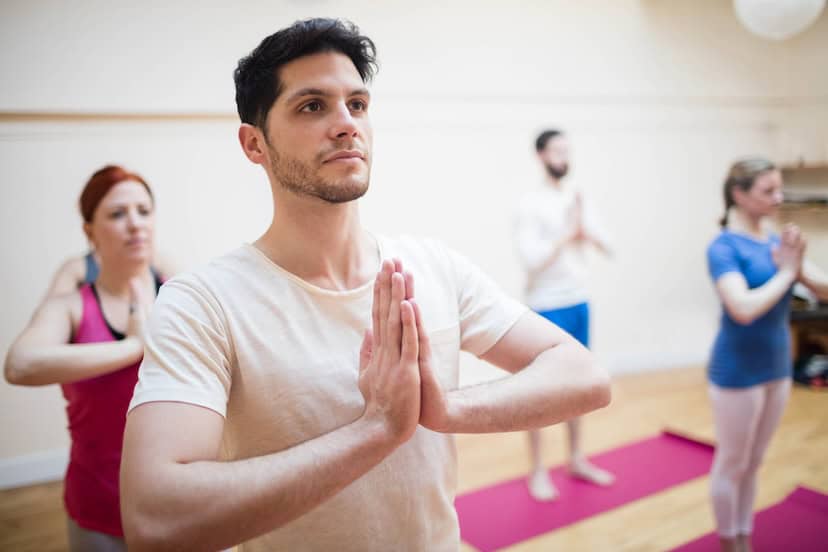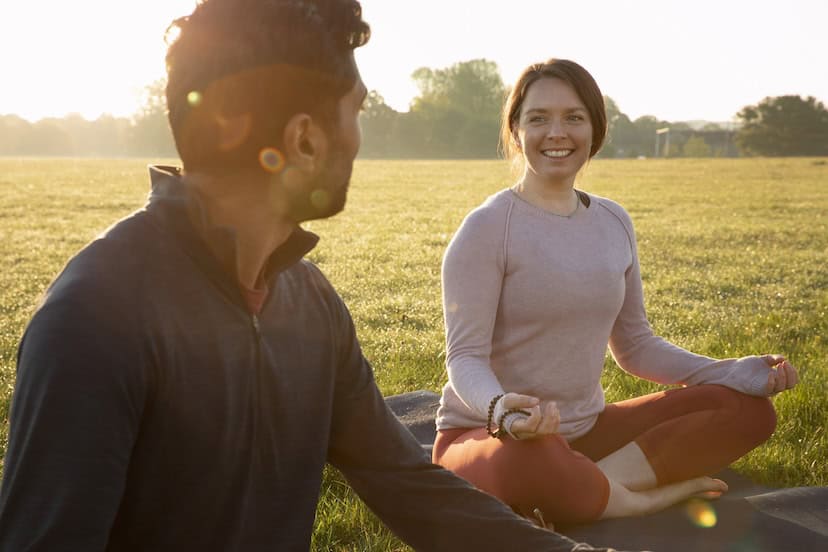Yoga Therapy in Arizona
As the fastest-growing state in the country, Arizona’s population is diverse and so are the people seeking addiction treatment.
Have you ever pulled a muscle or injured your leg? In order to feel better you had to find a balance. A balance between hot and cold, rest and stretching, elevation and compression. When it comes to healing parts of the body, especially those utilized frequently and consistently in our day-to-day lives, balance plays a huge role.
This same philosophy is also true when it comes to healing our minds. From substance use disorders to mental health conditions, there’s a balance to be found as you learn new skills to live the life you wish to lead.

In the past month, over 16% of Arizona residents reported symptoms of an anxiety disorder
So, how do you find that balance?
Here at Pinnacle Peak, we offer a well-rounded, multi-faceted, and evidence-based approach to recovery and healing. One program we offer that fits into this balance is our yoga program. Here in Arizona, we have some of the top-rated yoga experiences in the country. Let’s talk more about how we take this practice and truly amplify it, making it into a tool for healing.
What We Treat: Substance Use Disorders and Mental Health Conditions
When you’re managing a substance use disorder or living with an untreated mental health condition, it can quickly feel like your life is out of whack. Things that were once exciting are now dull. Activities you used to love you haven’t touched in months. Sometimes the world feels overwhelming while other times it feels like you can barely keep your head on straight.
While in the thick of things, it can seem like there’s no way to recover. How could you possibly step away from this and get yourself back in order? You’re not even sure where to start, and at times it seems easier to just keep going further down the path you’re on.
No matter how daunting it may seem, balance and healing are both possible no matter your history with substance use and mental health conditions. There is help and support out there waiting for you to take that first step.
How We Treat: How Yoga Complements Your Recovery
There’s a reason we offer several different types of treatment and complementary programs here at Pinnacle Peak. We know that a one-size-fits-all approach is not feasible, and we want to ensure that our clients have access to the care they deserve.
Yoga is one such option that we offer which falls under our holistic treatment category. It ties into our other programs as a way to help heal and soothe alongside the teachings learned throughout the rest of your treatment.
To the uninitiated, yoga can seem like an activity that only a certain type of person can enjoy. Many people picture yoga as fit people in tight clothes doing strange body contortions on colorful mats. That image alone may steer people away from the practice. They may feel they aren’t physically able to participate or that it is just an activity for people who are young, athletic, and exceptionally healthy.
Yoga is so much more than an hour on a cushy mat in a gym. Yoga involves focusing on the breath, postures, meditation, and one’s lifestyle to ultimately lead to a deeper connection with oneself. It teaches the fundamental skills necessary for creating a better balance of the relationship between the mind and body.
How is Yoga Used in Treatment?
With how deeply and thoroughly substance use and mental health conditions can shift a person’s life, a treatment program should reflect that, offering more than just basic talk therapy. Many people seeking treatment feel lost. They don’t feel connected to themselves, their loved ones, or their future. Some people are working through learning or relearning emotional regulation and recognition. There are many wounds that deserve proper time and energy during your healing journey.
This is where yoga can help.
Any form of exercise and stretching can be greatly beneficial for recovery. Science shows that exercise produces dopamine and overall improves mood. Many people find exercise and stretching to be relaxing, a way to focus on only themselves for a while.
These two components are tied to therapy and the skills being learned to set you up for a long-term road of healing. Whether taught on an individual level or worked on in small groups, these yoga sessions are great foundations for the skills you’re already learning elsewhere.
Call To Talk To One Of Mental Health Treatment Staff Members Today!
How Does Yoga Help with Substance Use and Mental Health Conditions?
For many people, yoga is more than just exercise. There’s a lifestyle and deeper, spiritual practice often linked with yoga and taught during yoga classes. If this component of yoga isn’t up your alley, however, don’t dismiss it entirely. There are still many key components of yoga that are relevant to all. Your instructors and therapists will work with you to make an approach suited to your needs.
Yoga is based on discipline, something that is often relearned or mended during the healing journey. The self-discipline gained through postures, breathing, and meditation transfers beyond recovery and into other aspects of life as well.
Yoga also teaches how to live in the present moment. Instead of being depressed about the past or anxious about the future, yoga practices encourage an acceptance of the present moment. When one appreciates life moment by moment, they take control of their life and disengage from unpleasant thoughts, feelings, and sensations caused by an unfocused mind.
Finally, yoga is a healthy routine. By regularly engaging in yoga during your recovery period here at Pinnacle Peak, you’re setting yourself up for a positive lifestyle change. Many people find it difficult to fill the voids left behind by the time they previously spent engaging in substance use. The same can apply to those who withdrew from loved ones or hobbies due to their mental health and now aren’t sure how to step back into them. Yoga offers a new hobby and routine to engage in that is not only good for the body, but also offers the space to deal with stress and other difficult emotions.

Look at the Science: The Neurological Benefits of Yoga
The various benefits of yoga continue to be researched and documented. On the surface, yoga helps improve physical health. Strength, flexibility, and lower blood pressure, as well as decreased anxiety, depression, and stress, are widely associated with routine yoga participation. Researchers and practitioners, however, are discovering that yoga provides more than just physical benefits. It creates positive changes in the brain and brings balance to the body and mind, leading to self-discovery and a state of well-being that sets you up for success in your recovery journey.
By routinely incorporating yoga practices into daily life, positive changes can develop in the brain. A meta-analysis of 15 studies looked at different aspects of brain functioning following yoga postures, breathing exercises, and meditation-based yoga.
Different yoga practices were found to affect brain wave activity. The changes in brain wave activity during and after yoga sessions were linked to more positive brain states. The study found many benefits such as:
- Decreased sensations of pain
- Increased sensations of calm
- Improved concentration
- Decrease in anxiety
- Better awareness
- Decrease in physical and emotional fatigue

How Yoga Can Help You During Any Stage of Your Healing Journey
We’ve already touched on some of the positive aspects offered by yoga during your recovery, but there’s a larger component we haven’t yet touched on – community.
One thing people don’t think to account for during their recovery is the potential need for a new network of people to engage with. Often, loved ones are either pushed away, or friendships are built on previous activities that you no longer wish to continue. This can lead to loneliness quickly if you’re uncertain of where to build these new bonds.
While many people build lifelong friendships during recovery, building relationships outside of this group is just as beneficial. By establishing the routine of practicing yoga, you have a chance to engage with the community around you. Many places offer free yoga classes, or you can take the additional step and get a membership somewhere. These classes are a great way to continue building and practicing your skills learned in recovery while making new friends along the way.
Get Started with Your Healing Today at Pinnacle Peak
If you’re feeling unbalanced and looking for a way to feel connected to yourself and your loved ones again, there are healing options available here for you.
We offer the full continuum of care under our roof for substance use disorders, mental health conditions, and dual diagnoses alike. We even offer specialized trauma treatment programs and programs designed with veterans in mind. From inpatient and outpatient services to our ongoing support with our alumni program, we’ll provide you with the high-quality and compassionate care that you deserve, every step of the way.
There’s no wrong time to get started. Whether you have a few questions or want to take that first step today, give our Pinnacle Peak team a call at 866-377-4761 and they’ll be happy to help.
Clinical Excellence | Compassionate Care | Family Feel
